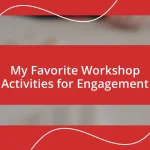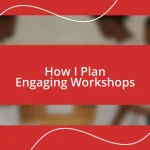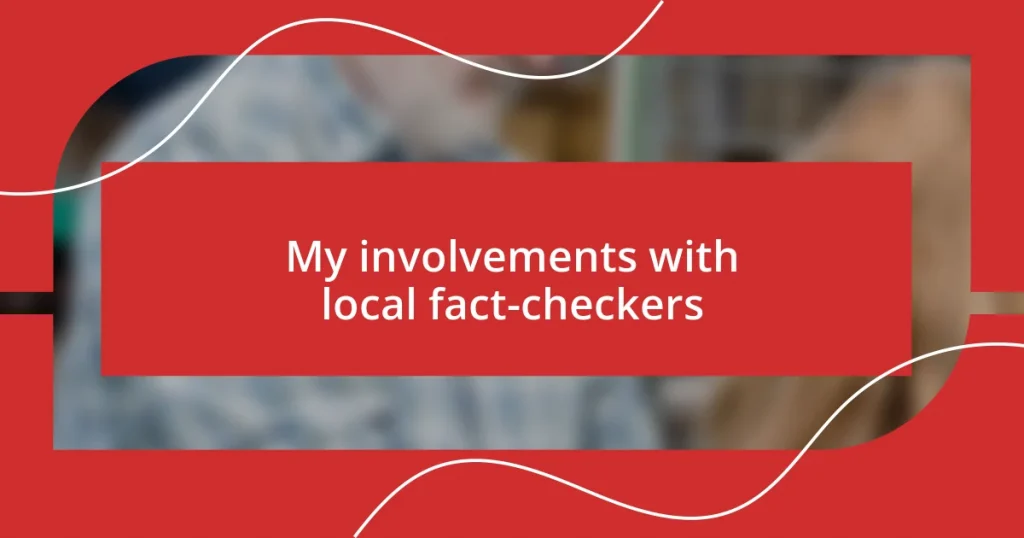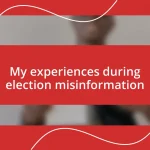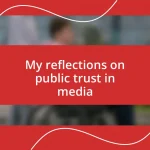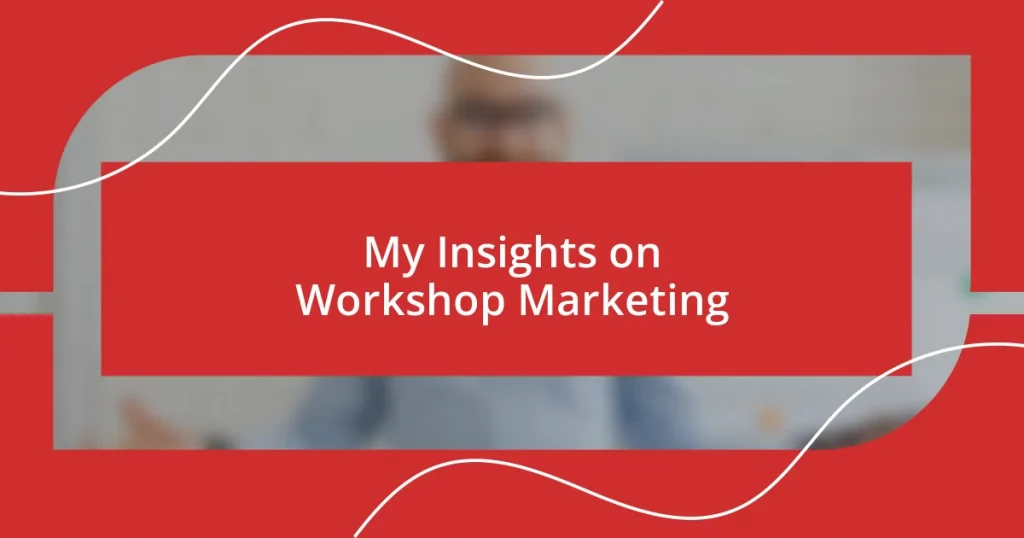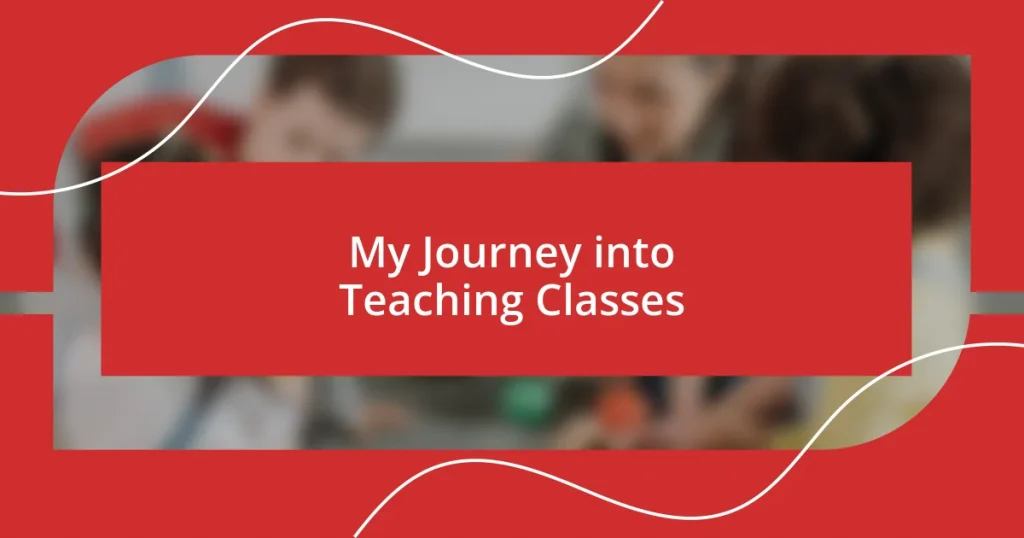Key takeaways:
- Local fact-checkers enhance community trust and accountability by verifying information and engaging with local narratives, thereby reducing misinformation.
- Successful collaborations, such as creating educational resources and hosting events, empower community members to think critically about information and advocate for truth.
- Future initiatives should focus on leveraging social media for outreach, partnering with local businesses, and investing in training programs for aspiring fact-checkers to strengthen community engagement.
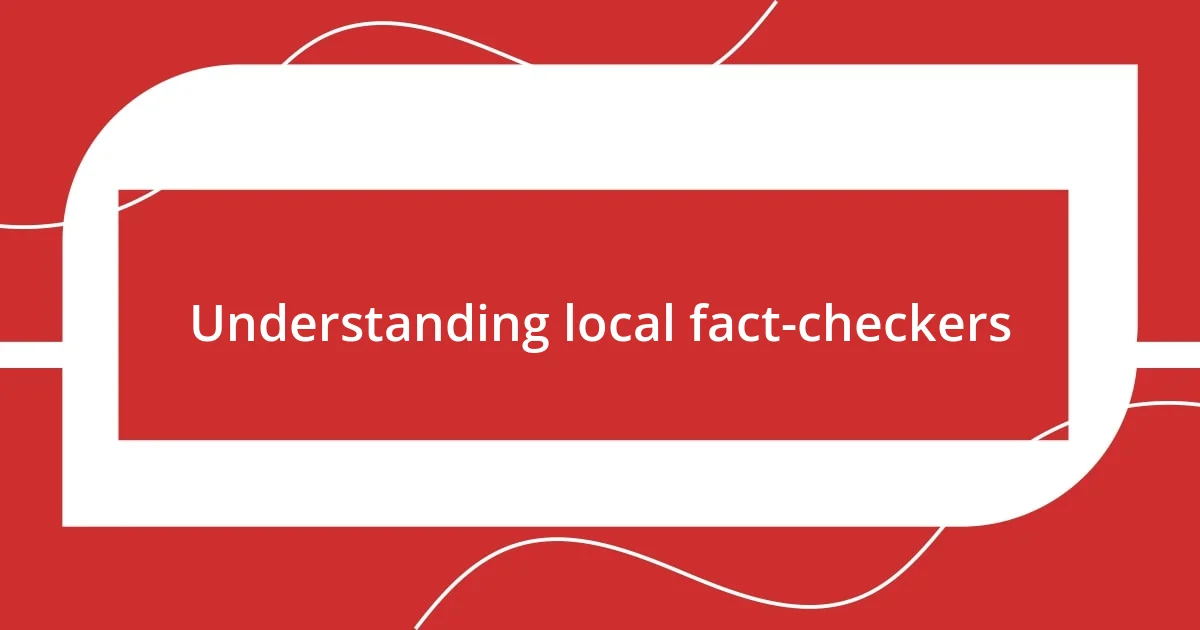
Understanding local fact-checkers
Local fact-checkers play a vital role in our communities by verifying information that circulates in local news and social media. I remember the first time I reached out to a local fact-checking organization after encountering a misleading post from a friend. It was eye-opening to see how they meticulously dissected claims, providing context that often gets lost in online sharing.
What strikes me about local fact-checkers is their deep understanding of regional issues; they aren’t just sifting through data but engaging with the community’s unique concerns. Have you ever considered how local narratives shape our understanding of larger events? This connection gives fact-checkers an edge in discerning the truth when local stories can sometimes carry much more weight on individual perspectives.
In my experience, engaging with local fact-checkers has made me more skeptical of unchecked information, encouraging me to question sources more critically. If we truly want to cultivate a well-informed society, shouldn’t we support those who protect us from misinformation? Their commitment not only bolstered my confidence in the facts but also fostered a sense of trust within our community.
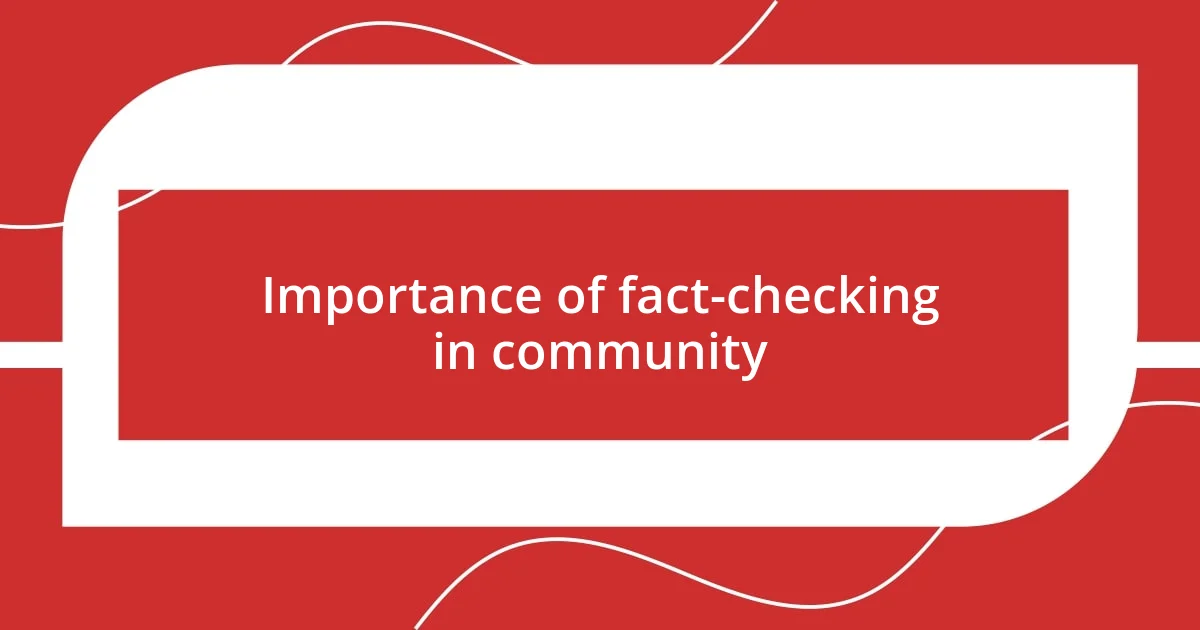
Importance of fact-checking in community
The role of fact-checking in our communities cannot be overstated. I’ve seen firsthand how a single verified fact can alter the course of conversations and even influence local elections. When misinformation spreads, it can create divides; I recall one instance where a community member misinterpreted a council decision, leading to weeks of needless panic. However, with the right fact-checking, those misunderstandings were cleared up, helping to restore calm and clarity.
Local fact-checkers don’t just validate facts; they foster a culture of accountability. One time, I participated in a workshop where we were taught to identify credible sources. It was enlightening to realize how many of us depend on social media without considering the implications. By empowering residents with tools to discern truth from fiction, fact-checkers lift us beyond passive consumers of news to active participants in our community dialogue.
Another aspect I value about local fact-checkers is their direct engagement with community narratives. When they address specific local myths—like exaggerated crime rates or false claims about schools—people start to see trust rebuild. I appreciate attending town hall meetings where fact-checkers provided clarity on contentious issues, allowing for informed discussions. It’s a reminder that, in the end, a well-informed community is not just more resilient but more united.
| Aspect | Importance |
|---|---|
| Verification of Local Information | Builds community trust and understanding |
| Accountability | Encourages informed discussions and critical thinking |
| Engaging Community Narratives | Reduces misinformation and fosters unity |
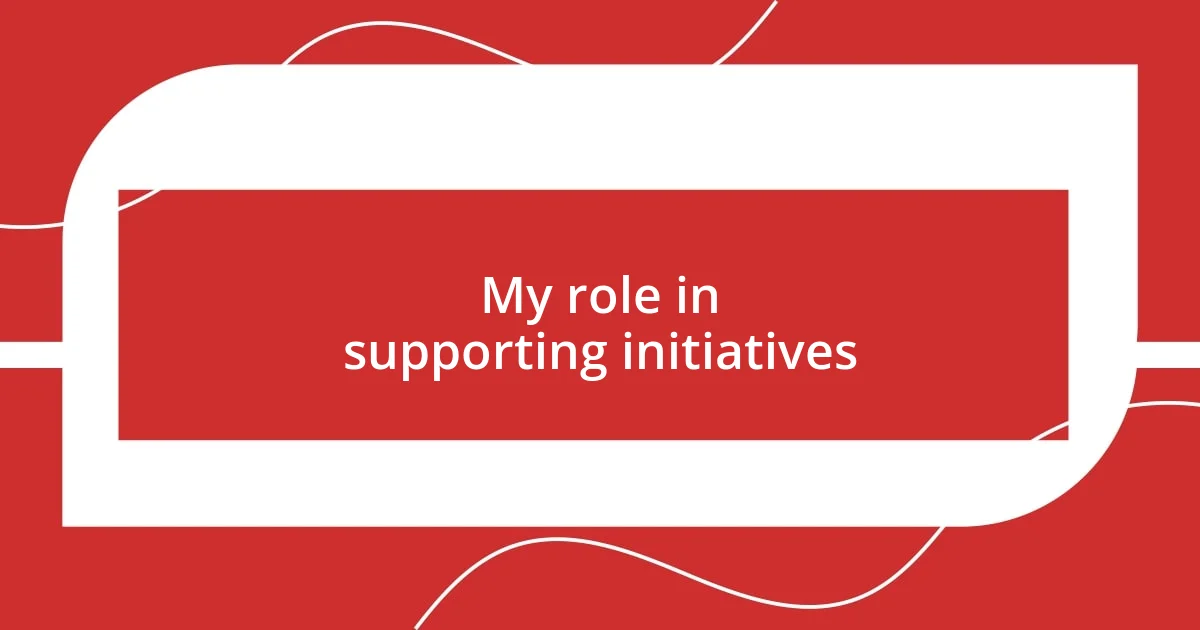
My role in supporting initiatives
In my journey with local fact-checkers, I’ve found that supporting their initiatives brings immense satisfaction. One memorable moment for me was volunteering at a community event where we discussed the importance of reliable information. Seeing people’s eyes light up as they learned how to spot misinformation firsthand was incredibly rewarding. It reinforced my belief that these initiatives lay the groundwork for healthier discourse in our community.
- Participating in Workshops: I contributed to workshops that equipped residents with critical thinking skills, which was both enlightening and fulfilling.
- Promoting Awareness: I organized social media campaigns highlighting the role of local fact-checkers, helping spread the word about their invaluable work.
- Engagement in Local Events: By attending town hall meetings, I supported fact-checkers as they clarified critical issues, strengthening community bonds.
Engaging with fact-checking initiatives has often felt like a personal mission for me. There was a time when I collaborated with a local group to create a newsletter focused on debunking prevalent myths in our area. Not only did that experience sharpen my own analytical skills, but it showed me how collective efforts can bridge gaps in understanding. Each small step we take supports a larger movement toward a well-informed society, nurturing trust within our community.
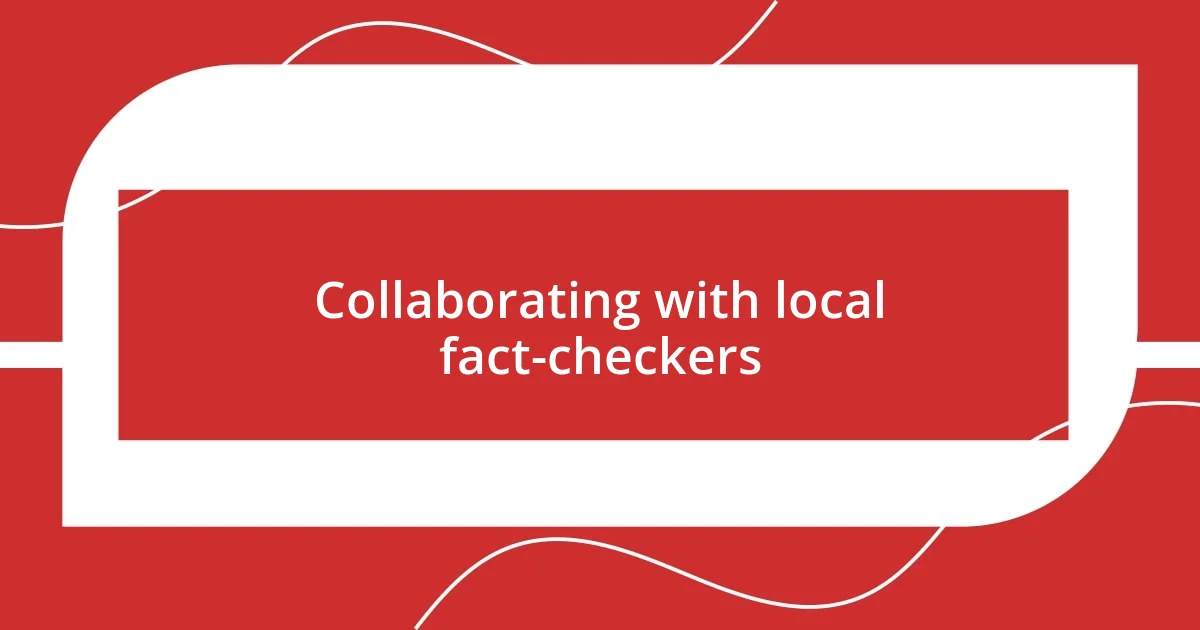
Collaborating with local fact-checkers
Collaborating with local fact-checkers has truly opened my eyes to the richness of community engagement. When I first teamed up with them, I remember feeling a mix of excitement and apprehension. Would my contributions really matter? It didn’t take long to realize that together, we were not just examining facts; we were building trust among neighbors and empowering people to think critically about the information they consumed.
I particularly enjoyed one collaboration that focused on debunking myths surrounding local healthcare resources. As we developed a straightforward guide, I was struck by how eager community members were to engage with the material. It reminded me that fact-checking is not merely an academic exercise; it speaks to people’s lives. It was rewarding to see individuals gain confidence in asking questions and seeking clarity, which only strengthened our community ties.
Reflecting on these experiences has led me to wonder: what if more local organizations partnered with fact-checkers? Imagine the profound impact! By fostering these connections, we can create a ripple effect, enhancing our collective understanding and driving home the importance of reliable information. I believe that every collaboration is a step toward a more informed and cohesive community, and being a part of that journey feels incredibly fulfilling.
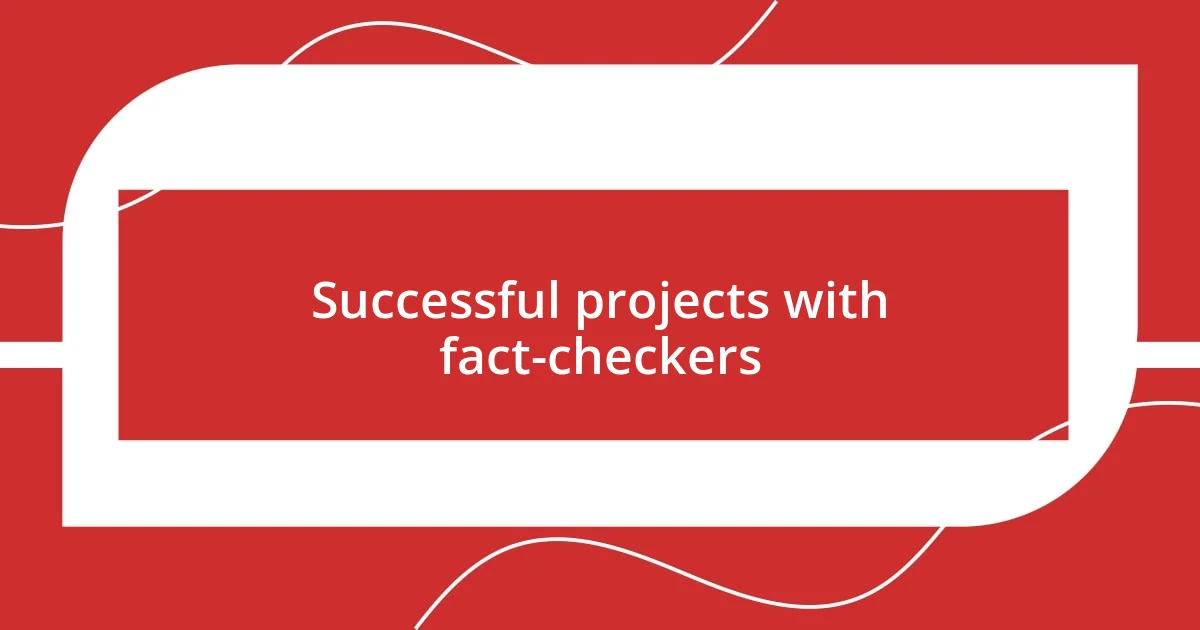
Successful projects with fact-checkers
One successful project that stands out in my memory was our joint effort to create an online resource library, aimed at debunking common misconceptions about local environmental issues. I recall the excitement in the air as we gathered data and witness firsthand how community members interacted with the resources. It became clear that this was more than just a website; it was a lifeline for individuals trying to navigate a sea of conflicting information. Seeing people actively browsing through our curated content and asking questions made me realize how vital our work was.
Another project I’m proud of involved partnering with high school students to produce short videos that illustrated the fact-checking process. The energy and creativity they brought to the table were invigorating! I can still picture their enthusiasm as they unpacked complicated issues, making them accessible to their peers. This initiative not only educated a younger audience but also empowered them to become advocates for truth in their circles. How often do we overlook the potential of our youth in this fight against misinformation?
I also remember a particularly impactful town hall event where we had fact-checkers present real-time data verification. The palpable tension in the room shifted as attendees asked tough questions and learned how to discern fact from fiction. It was a moment of connection; people were not just absorbing information, but they were also actively seeking it out. It made me reflect on the need for more of these interactive forums where discussions thrive and skepticism is welcomed. Isn’t it fascinating how collaboration can transform communities into informed, engaged citizens ready to challenge misinformation together?
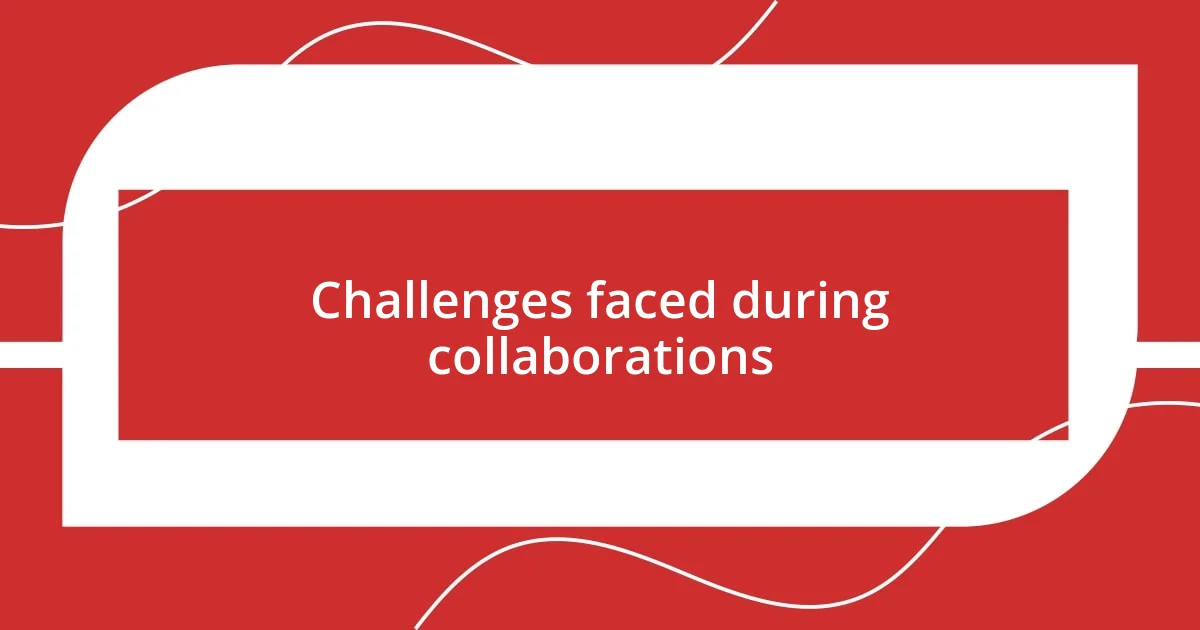
Challenges faced during collaborations
One of the most significant challenges I faced during collaborations with local fact-checkers was coordinating schedules. With so many dedicated individuals involved, it often felt like trying to assemble a puzzle with missing pieces. I vividly recall a brainstorming session that had to be rescheduled multiple times, leaving me wondering if we’d be able to maintain the momentum. The reality is, time constraints can inhibit the creative flow, making it tough for everyone to contribute their best ideas.
Another hurdle was the varying levels of familiarity with fact-checking practices among team members. I once participated in a workshop where some attendees struggled to grasp basic concepts, while others were more advanced. It was a delicate balancing act, trying to foster an environment where everyone felt included and was able to contribute meaningfully. I found myself thinking, how do we bridge this knowledge gap without leaving anyone behind?
Lastly, I noticed that differing communication styles among collaborators sometimes led to misunderstandings. There were moments when I felt frustrated trying to convey the urgency of a particular issue, only to realize that not everyone shared the same perspective. It made me question how often these perceived pitfalls could be transformed into learning opportunities. By openly addressing these differences and promoting dialogue, I learned that we could ultimately enhance our collaborative efforts.
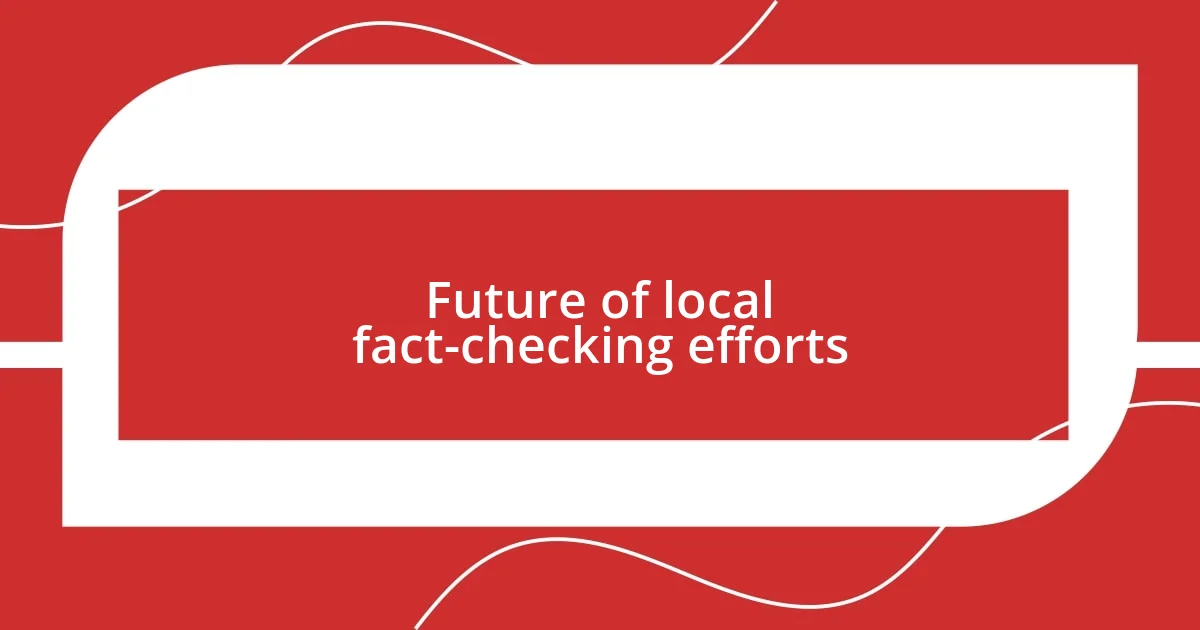
Future of local fact-checking efforts
As I ponder the future of local fact-checking efforts, I see a promising shift toward community engagement. Just the other week, I participated in a workshop where we discussed leveraging social media platforms to amplify fact-checking initiatives. It struck me how adaptable our strategies need to be in this digital age. How often do we miss out on reaching people exactly where they are?
Looking ahead, I envision local fact-checkers fostering partnerships not just with organizations, but also with local businesses. Imagine a small café prominently displaying fact-checking resources or hosting a “Truth Talk” series where community members can gather to discuss current events. I recall a similar initiative in one neighborhood where local shops became hubs of information exchange. It was inspiring to witness local folks engage in meaningful conversations, sparking collective awareness.
Moreover, I believe we must invest in training programs for aspiring fact-checkers. I still remember mentoring a group of volunteers who were eager yet inexperienced in tackling misinformation. It was rewarding to see them grow, not just in skill but in confidence, as they learned to question sources and analyze data critically. Isn’t it exciting to think about how these future fact-checkers could change the landscape of information integrity in our communities?




